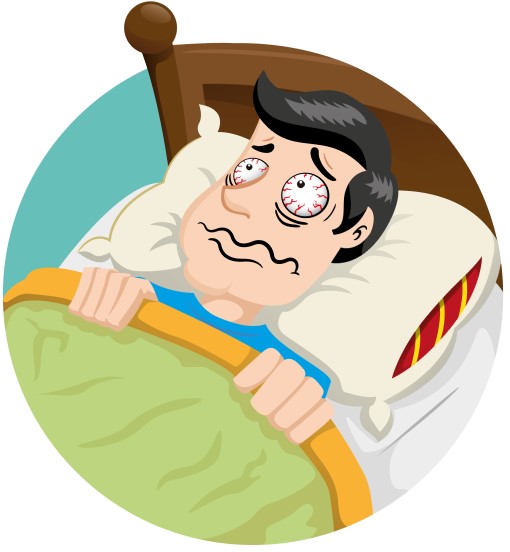
9 Remedies worth a try if you drank too much coffee and can’t sleep
By Jason Wooden, PhD | March 28, 2021
If you’ve drank too much coffee and can’t fall asleep, it’s no surprise since the typical cup of coffee contains around 95 milligrams of caffeine and can take hours to wear off.
Caffeine makes it harder to fall asleep, robs you of deep sleep, and causes more night time bathroom visits.
To fall asleep more quickly, you can try relaxing music, adjusting your sleep environment, gentle stretching, relaxation exercises, a warm bath or shower, aromatherapy, and white noise.
Millions have joined the drank too much coffee can’t sleep club
Nothing is more frustrating than being desperate for sleep yet wide awake because you drank too much of your favorite coffee beverage too late in the day and can’t fall asleep.
You knew you shouldn’t have done it, but hey, that’s water under bridge.
And the truth is you’re not the only one given the popularity of coffee.
In the US, the average American drinks over 3 cups a day. Worldwide around TWO BILLION cups are consumed every day.
(Yes, that’s not a typo…)
That’s a lot of coffee and likely millions of people fighting insomnia every night.
And millions of people in the too much coffee can’t sleep club.
People drink coffee for varied reasons – waking up in the morning, a pick me up to make it through the afternoon or evening, or just for the pure pleasure.
Regardless of your reasons, it’s all the same to your sleep.
And most people aren’t aware of all the things it’s doing to their body even though they’re paying the price.
Let’s take a look at what’s happening, some practical things to help you fall asleep more quickly, and what you can do to stay out of caffeine trouble.
The many ways coffee can wreck your sleep
A typical cup of coffee (8 fluid ounces or 237 grams) contains around 95 milligrams of caffeine.
Most people know drinking too much coffee, especially at night, can make it hard to fall asleep. Few are aware of what it actually does to the body.
Caffeine screws up your sleep-wake cycle
It’s a stimulant that binds adenosine, a biochemical sleep factor, and keeps it from doing its job to make you sleepy. This delays your body clock which is why you may find yourself wide awake hours past your bedtime.
Caffeine robs you of deep sleep
What many people may not realize is that once you fall asleep the caffeine is not done causing problems. It can actually reduce the amount of deep sleep you get.
Deep sleep is really important because that’s where all the good stuff happens – the body restores and replenishes itself. So, you really don’t want to miss out on it.
More frustrating night time wake ups
Another downside from having coffee too close to bedtime is that it can lead to more visits to the bathroom during night. Too much fluid before bedtime does this to many people, but you get extra trouble with caffeine because it’s a diuretic.
How long the caffeine from your coffee can stick around and keep you awake
If you’re wondering how long it will take your coffee caffeine to wear off so you can fall asleep, you shouldn’t be surprised it’s not the same for everyone.
It will depend on how sensitive you are to caffeine. Many factors have been found to affect caffeine sensitivity, including genetics, gender, body weight, and hormonal changes. (I’ve previously written about this here.)
And obviously, it’s going to depend on how much coffee you drank and how close to bedtime it was.
Generally, when you consume caffeine, it reaches a peak level in 30 to 60 minutes. Once it’s in you, it has a half-life of 3 to 5 hours. (This is the time it takes to eliminate half of the amount you consumed.)
Another important factor is age. Recent research has shown that over time you can become more sensitive to caffeine due to biochemical changes in the body.
What this all means is that if you drank too much coffee and can’t sleep, it could be hours before your body processes enough of the caffeine that you start to feel sleepy.
Again, exactly how long will depend on your body and other factors.
The sugar in your coffee is just as bad for sleep
Many people like to add a spoon or two of sugar to their coffee. They enjoy the taste and extra kick.
And coffee beverages such as a mocha can have a ton of sugar. We’ve all heard about how too much sugar can lead to weight gain and increase the risk for diabetes.
It turns out it’s just as bad for sleep.
Did you know that research has linked high sugar intake to restlessness and poor sleep?
Excessive dietary sugar is now also linked to inflammation in the body. In fact, there’s growing evidence that inflammation and sleep are connected.
And let’s not forget what all that extra inflammation can do to aggravate any pain and stiffness you have. Both are a major issue for sleep on their own.
But wait, there’s more…
Sugary beverages can increase your risk for type 2 diabetes, weight gain, heart disease, and other chronic diseases. Many of these health issues can cause problems for sleep.
So, if you can’t sleep because of your coffee, it’s not just the caffeine. The added sugar can make things worse.
The 9 remedies worth a try when coffee is keeping you awake
Now, that you know what you’re up against, let’s look at what can help get things back on track when you’ve drank too much coffee and can’t sleep.
Keep in mind it’s going to take some time for the caffeine to wear off. As I mentioned earlier, just how long will depend on your caffeine sensitivity and various other factors.
What’s important is to avoid doing the wrong things as you pass the time. If you’re not careful, you can get yourself even more wired up and anxious, making it even harder to fall asleep.
Especially, if you play the clock game and keep thinking “I’ve got to go to sleep…I’ve got to go to sleep”.
And then instead of hours of insomnia you could be up half the night or more.
So, what you decide to do or NOT to do can make a big difference.
Here are some things worth a try that can help you transition to sleep more quickly:
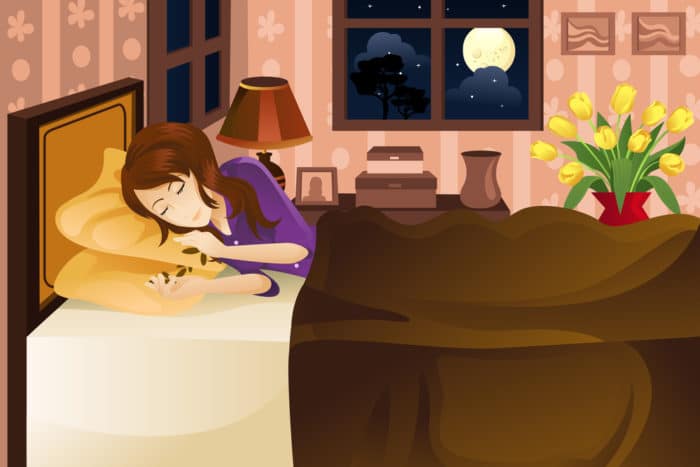
1) Adjust your sleep environment
Make sure you have a sleep friendly bedroom. It should be dark, quiet, and cool.
Too hot, you’re tossing and turning. Too cold, you’re shivering. Studies suggest keeping your room between 60 and 67 degrees Fahrenheit (16 – 19 degrees Celsius) is optimal for sleeping.
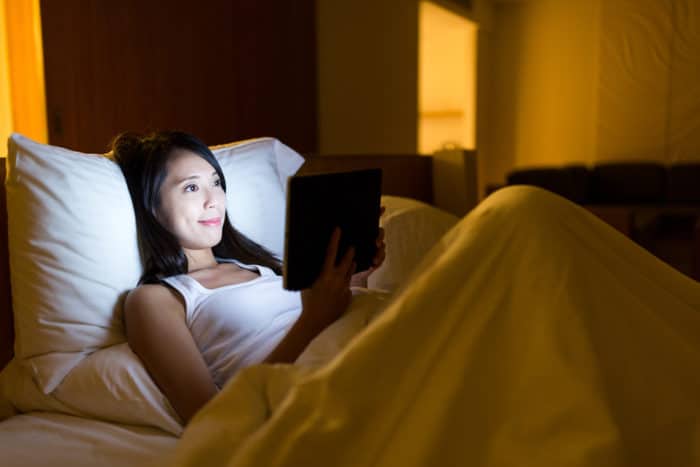
2) Turn off your electronic devices
Smartphones, tablets, and TVs emit bright blue wavelength light that can delay your natural sleep-wake cycle. That will keep you up even later.
Beware of social media and YouTube. There’s just too many enticing posts and videos to view. Too many things that can get you even more wired up.
Learn more:
Night time electronics risks and blue-light blocking glasses for insomnia prevention
Why YouTube is keeping you from sleeping
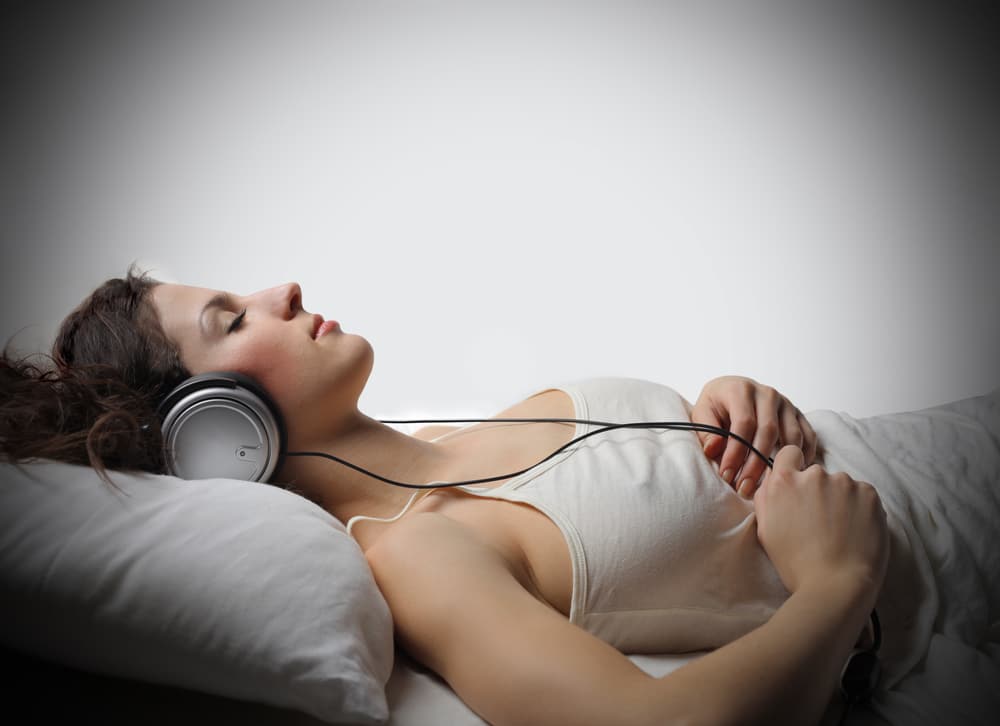
3) Try relaxing music
Soothing music such as quiet classical tracks can help calm down the body and mind, making it easier to fall asleep.
Slow rhythm songs (60 to 80 beats per minute) have been shown in studies to improve sleep.
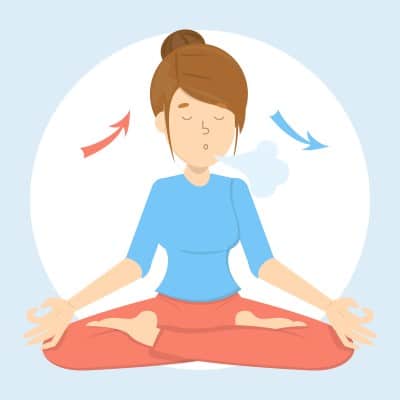
4) Try a breathing relaxation exercise
Deep breathing is a simple way to calm the body. One popular technique is 4-7-8 breathing.
Pioneered by Dr Andrew Weil, it involves regulating your breathing to various counts of 4, 7 and 8.
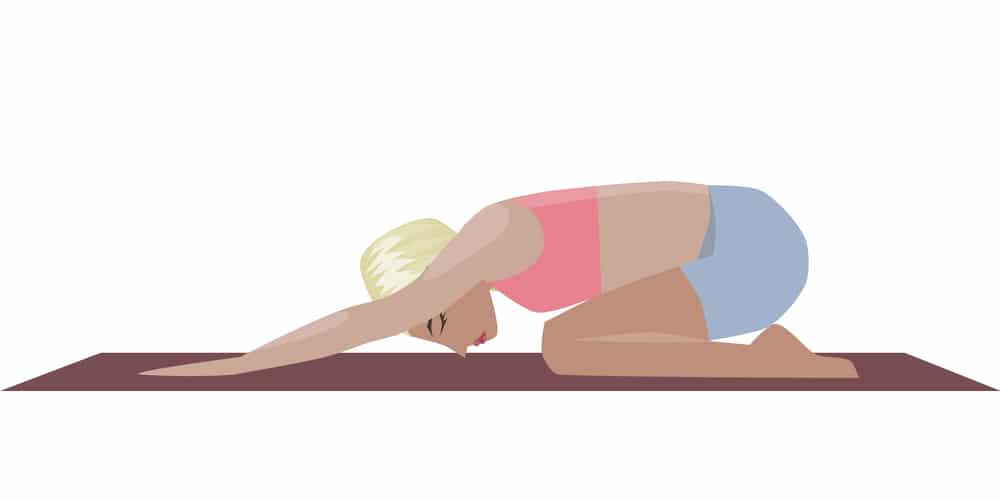
5) Gentle Stretching
Light stretching can help the body relax. It may also help with the aches and pain that keep people from sleeping deeply.
Learn more: 8 Stretches for Your Best Night’s Sleep (SleepAdvisor.org)

6) Try a warm bath or shower
Did you know your body temperature naturally dips at night before bedtime? It’s one of the things that can signal your body it’s time for sleep.
A warm bath or shower can help you relax while raising your body temperature. When finished you return to a cooler bedroom and get a temperature saying it’s time to sleep.
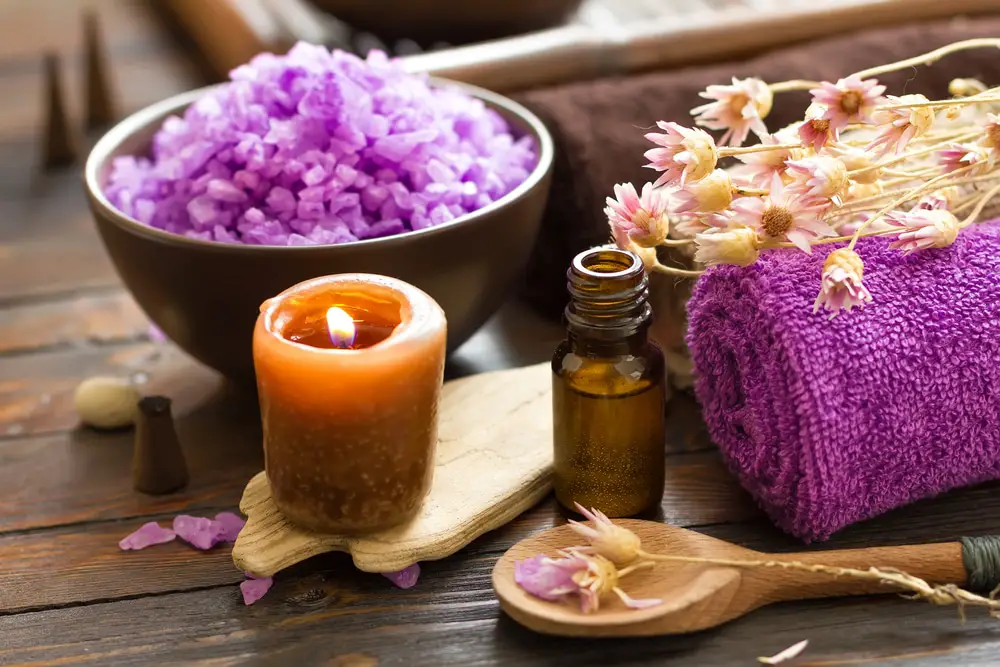
7) Try aromatherapy
Scents are powerful things. Studies have shown that lavender essential oils can help relax the body and promote sleep.
While lavender oil is the most studied, extracts from yellow citrus fruits such as bergamot and yuzu can also have calming effects on the body. Be sure that the oil extract you use is of therapeutic quality and purity.
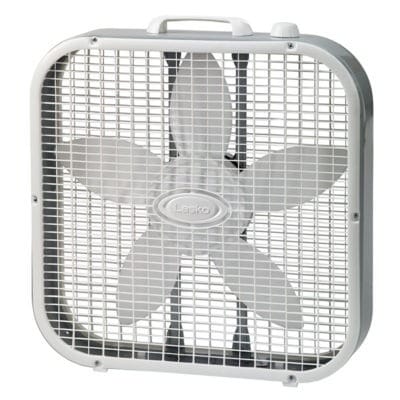
8) Try white noise
White noise can reduce the difference between regular background noise in your environment and other sounds that can arouse you out of sleep. Some people also find that it’s calming and it makes it easier to fall asleep.
Learn more:
Best fan for white noise to help your sleep
White noise phone apps
8 Best Sound Machines for Sleep of 2020 (Verywell Health)
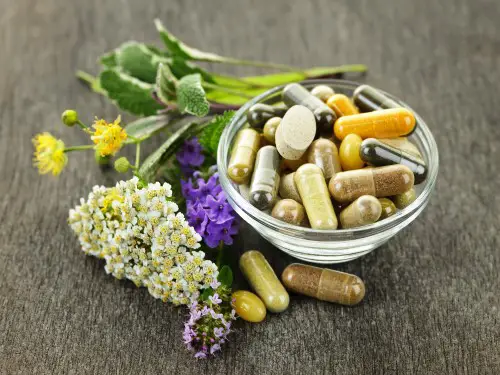
9) Try a natural sleep aid
There are all sorts of natural supplements that can help the body transition to sleep.
While they haven’t been directly tested for caffeine relief, many can help fight the anxiety and stress that can keep people from falling asleep.
Some have been scientifically tested while others have not.
Making your coffee more sleep-friendly
If you’re going to drink coffee, how about making a couple tweaks to how you consume it that can pay off later at night?
A couple simple changes worth considering, especially later in the day, include:
Avoid coffee late in the day
Yes, this is pretty obvious but had to include it here. Avoid coffee in the evening. If you’re really caffeine sensitive, you may have to stop drinking it as soon as early afternoon.
Go decaf late in the day
Okay, another obvious one, but worth giving another try. A typical decaf cup of coffee contains around 2 milligrams of caffeine which is way less the 95 milligrams you get in regular coffee.
Use less coffee
When making up your next batch, add less coffee to the mix while keeping the amount of water the same.
Switch to Arabica coffee
The two most widely used coffee varieties are the Robusta and Arabica beans. Arabica coffee beans contain half as much caffeine as Robusta. It also tends to be smoother and less bitter.
Try a dark roast
Dark roasts may have slightly less caffeine than lighter roasts. Learn more
Try instant coffee
It generally contains less caffeine than regular brewed coffee.
Watch the sugar
Try cutting the amount of sugar in your coffee later in the day. You might even want to switch to a healthier sweetener instead of the usual white sugar. Learn more
Coffee alternatives that won’t keep you awake
One way to keep coffee from ruining your sleep is to avoid drinking it in the evening.
In fact, sleep experts recommend that you avoid caffeine 4 to 6 hours before bedtime. And is I mentioned earlier, if you’re really sensitive, you may need to avoid coffee as early as the afternoon.
Fortunately, there are plenty of alternatives worth a try.
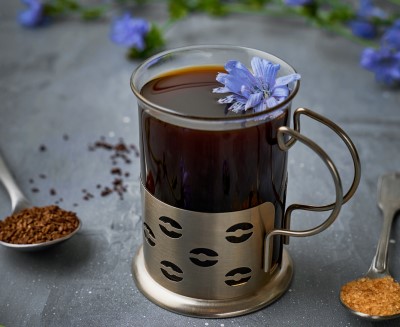
Chicory Coffee:
Available online and made from roasted roots of the chicory plant, it tastes similar to coffee but is caffeine free.
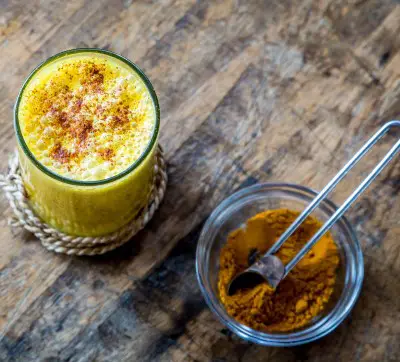
Golden Milk (Turmeric Tea):
Golden milk is a traditional Indian drink made with warm milk, ginger, cinnamon, turmeric, black pepper. Vanilla and honey is often added for a little extra flavor.
Learn more:
Golden milk recipe (easy)
Golden milk recipe (fresh turmeric root)
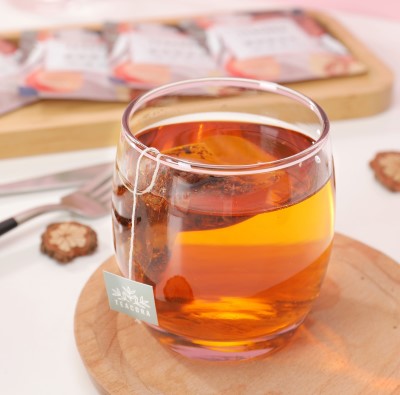
Rooibos Tea:
Slightly sweet and caffeine free, Rooibos tea is made from leaves of a shrub native to South Africa.
Learn more:
Rooibos cacao latte
Red Rooibos Mocha Latte
Health benefits (Mecialnewstoday.com)
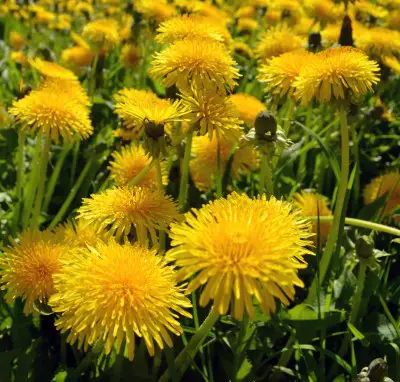
Dandelion Root Coffee:
Made from roasted roots of the Dandelion plant, it has a taste similar to coffee. You can roast your own roots or buy it ready to go online.
Learn more:
Dandelion root coffee recipe (roasted roots)
Dandelion root coffee recipe (tea bags)
Health benefits and side effects (Verywellhealth.com)
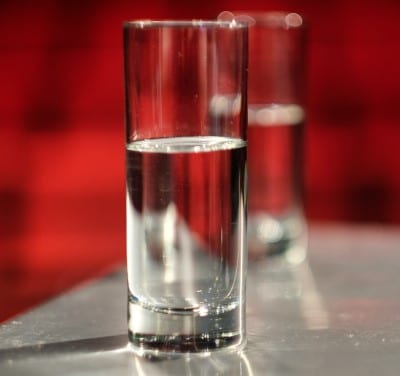
Water:
Yes, it’s boring compared to cola, but nothing is healthier. Did you know that dehydration can be a sign of fatigue?
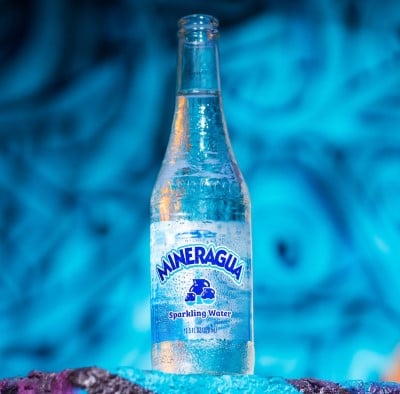
Sparkling water:
It gives you pop and fizz without the caffeine or sugar.

Flavored sparking water:
You can find fizzy water flavored with lime, strawberry, and many other flavors. You can also just add slices of your favorite fruit to a glass of fizzy water.
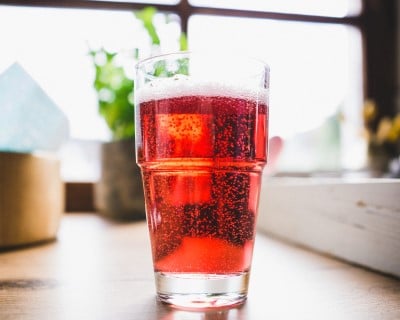
Sparkling water with juice :
Add your favorite fruit juice to fizzy water. Make sure you use juice with no added sugar.
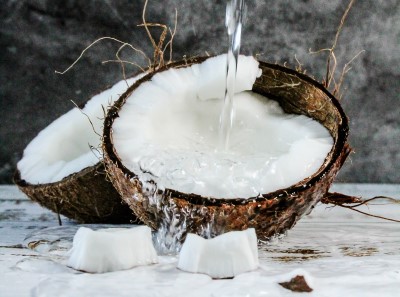
Coconut water:
A popular drink with natural vitamins and electrolytes.
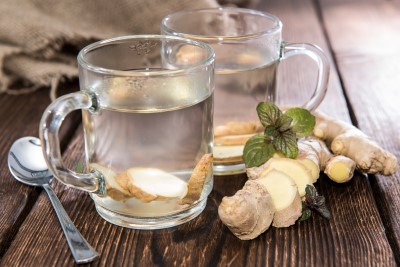
Ginger root tea:
Ginger root has been linked to many health benefits. It’s believed to fight fatigue by improving blood circulation and blood sugar levels.
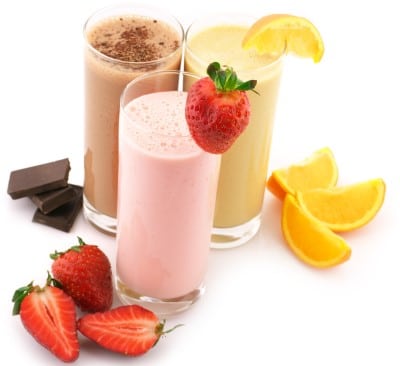
Protein shakes:
Did you know that too little protein can cause fatigue? The body needs it for fuel to help repair and build tissues.
Other things you can do to keep your energy up include:
Power nap – A quick nap can boost your energy and productivity. There’s a right way to do it so you don’t wake up groggy. Learn more
Physical activity – Getting the heart rate up and the blood flowing can raise your energy. If pressed for time, try a 10 minute walk.
Eat smaller meals – Heavy meals can slow down your metabolism and make you feel sluggish.
Are you drinking too much coffee at night because you’re addicted?
Have you found you just can’t go without that last evening sip of coffee? If you find you’re having a hard time cutting back, you may be addicted.
The signs of caffeine addiction include:
- anxiety
- headaches
- nervousness
- irritability
- moodiness
- dizziness
- feeling jittery
- racing heart
- dehydration
If this is you, it’s best to slowly cut down your coffee intake. There’s a right way to wean yourself off of caffeine.
Learn more:
Tips for Breaking the Caffeine Habit (Cleveland Clinic)
Other things coffee drinkers can do for their sleep
So far, we’ve mostly talked about what you can do to get your sleep back on track if your coffee gets you into trouble.
But these are all remedies.
If you use coffee to get through the day, a big reason people are dragging or are not as mentally sharp as they could be is poor sleep. In fact, every night as many as a third of adults worldwide struggle with sleep.
What you really need to do is develop lifelong habits that will help you get great sleep every night.
So, you need to practice good sleep hygiene, the everyday habits known to affect sleep:
- keep consistent wake up & sleep times
- exercise during the day
- avoid large meals, alcohol, or stimulants such as caffeine before
- bedtime
- maintain a regular bedtime routine
- avoid using TVs, laptops, or other electronics before sleep
- keep your bedroom dark, cool, quiet, & relaxing
I’ve already mentioned some alternative beverages that can help you avoid having coffee at the wrong time.
It’s also important to get a checkup from a doctor, especially if poor sleep is an ongoing issue for you.
Too much coffee too late at night may not be the only issue you’re up against.
There’s a long list of health issues linked to poor sleep including chronic pain, heartburn, cancer, dementia, and asthma. You may also be living with an undiagnosed sleep disorder such as sleep apnea.
And some medical conditions can more directly cause fatigue. Being anemic, thyroid issues, chronic fatigue syndrome, diabetes, and depression can all make you feel run down.
Avoiding coffee and better sleep hygiene will not by themselves fix these issues.
You may also be interested in:
17 Sleep friendly ways to pass the time when bored in bed at night
How to stay awake during a Zoom online class
16 Things to try to keep from falling asleep at work
How to stay awake at work while pregnant
How to go to sleep after drinking an energy drink
Sources:
1. “NCA releases Atlas of American Coffee”, 2020, National Coffee Association of U.S.A. website
2. “Coffee is the most popular drink worldwide with around two billion cups consumed every day.”, British Coffee Association website
3. “Sleep and Caffeine”, 2013, American Academy of Sleep Medicine website
4. “Urinating more at night”, MedlinePlus
5. Distinct sensitivity to caffeine-induced insomnia related to age. Journal of Psychopharmacology, 2018, volume 32, issue 1, pages 89-95.
6. Fiber and Saturated Fat Are Associated with Sleep Arousals and Slow Wave Sleep, J Clin Sleep Med 2016;12(1):19–24.
7. “The Scary Effects Sugar Has on Your Sleep”, 2019, cpap.com
8. “Sugary Drinks”, Harvard School of Public Health website
9. “What affects the caffeine content?”, MeadicalNewsToday
10. World Sleep Day Talking Points, World Sleep Society website
Connect with us:
About Us
Better Sleep Simplified® was founded as a place for you to get clear and well-researched information.
Our goal is to make sure you know about your options so that you take action sooner rather than later.
Check us out on YouTube:
Watch and Learn
Helpful sleep tips, interesting sleep facts and statistics you want to know about
Affiliate Disclosure
This site is a participant in the Amazon Services LLC Associates Program and other affiliate advertising programs designed to provide a means for sites to earn advertising fees by advertising and linking to them.
Important: BetterSleepSimplified.com is for informational purposes only and is not intended or implied to be a substitute for professional medical advice, diagnosis, or treatment. Always consult a physician for sleep and health concerns. See additional information.
